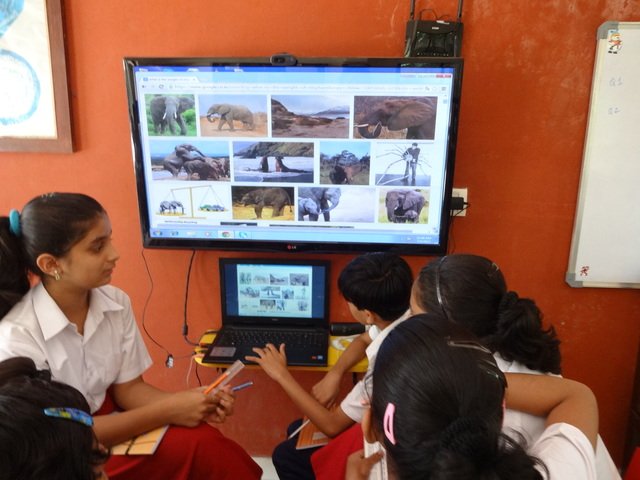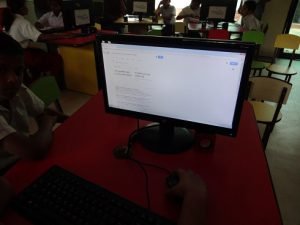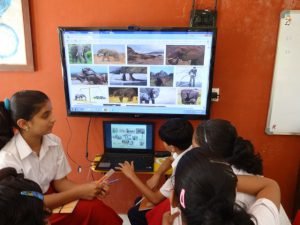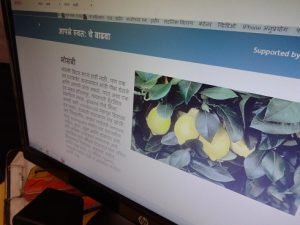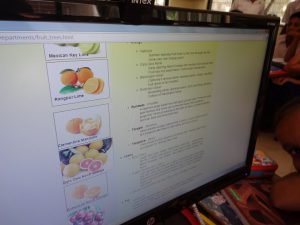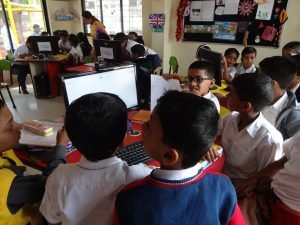Note: This description, related to the process by which search skills tend to develop in children from language backgrounds other than English, is based on observations over the course of the past 10-12 years in varied Granny Cloud centres & SOLE labs in India. It has been prepared primarily for the eMediators [Grannies] of The Granny Cloud since it is one of the key long term goals, and there is ongoing exploration of how these activities can be included in Granny sessions.
The Granny Cloud grew out of our experiences with Sugata’s first SOLEs in Hyderabad, India [2007-2009]. The SOLEs, as most of you know, have the ability to search on the internet at its core. It became painfully clear in the first few months of the SOLE labs being set up in Hyderabad that the children’s capacity to make sense of the material on the internet was severely limited by their lack of reading comprehension in English. It was true then [and remains so to a large extent even today] that a lot of material on the internet is in English and unless children are capable of reading with meaning and discernment, their capacity to explore BIG questions remains rather inadequate. This can lead to simultaneously painful and amusing situations where a child comes eagerly wanting to share their ‘answer’ with you and you see “No matches were found for this search” written laboriously on their notebook! 🙁
So, quite naturally, the focus of The Granny Cloud was on developing at least a rudimentary understanding of English; enabling the children to converse in it as well as make sense [reading with meaning] of what they were reading. All this, while keeping in mind that the development of search skills was a longer term goal. This included aspects like using web browsers, search engines, key words, opening appropriate search results, navigating links, as well as content related aspects such as choosing relevant information thrown up in the search from various links, and organizing and presenting it in a way so as to address at least a part of the question they were seeking to answer/explore.
Many more aspects of knowledge acquisition became observable during the course of those first few years [2008-2009] and later during the School in the Cloud project [2013-2016] and while interacting with and observing children across many independent Granny Cloud locations [2009 to present]. What also became more and more apparent were the challenges in having SOLE sessions over Skype which remains the Grannies typical modus operandi. So a bulk of Granny sessions involve songs, stories, talking games and other activities focusing on developing English language as well as basic computer skills interspersed with small search activities often driven by the children’s curiosity aroused by a topic that comes up in
conversation with a Granny, which are often referred to as ‘mini SOLEs’.
The development of search skills remained a goal even as we acknowledged in The Granny Cloud that it would take time to ‘get there’. Part of the reason we kept up with the focus on conversation, vocabulary, sharing ideas and experiences while using various strategies including text chats or Linoit/Padlet canvasses to facilitate reasoning, reflection and continuity, was that it was also hard to have sessions involving search activities when the facilitator [in our case – the Grannies] were not physically present with the children. This included challenges [quite apart from the basic one of limited English fluency] such as erratic internet connectivity, sound distortions, unavailability of space and adequate numbers of working computers as well as not being able to see the children if they went ‘off camera’ or disappeared to other computers that you couldn’t see [which meant that neither could you see the children, nor what links they were accessing, nor understand what they were saying if they spoke in their own native languages]. Additional challenges included the children’s relative lack of familiarity with computers and access to computers and the internet being typically restricted to Granny sessions in many centres. [https://thegrannycloud.org/all-kinds-of-sessions/]
Yet, efforts to move the children towards ‘mini SOLE sessions’ [and possibly full-fledged SOLE sessions] remains a long term goal of The Granny Cloud. Almost all the locations The Granny Cloud reaches out to [in India and elsewhere] share in common inadequate fluency and reading comprehension in English. This quite naturally affects children’s participation in SOLE sessions, typically manifested in their inability to ‘search. Learning a ‘foreign’ language through the limited exposure afforded to them through Granny sessions, while ‘dramatic’ in many ways, was quite an uphill task and even after a couple of years of interaction with the Grannies [translating into a total of approximately 70-75 hours, over 2 school years]; the fluency with which the children could converse or make sense of what they read on the internet was still relatively limited and certainly did not bear comparison with a native English speaking child. But there were other key skills that the children picked up during that initial exposure that had a positive impact on their capacity to search.
So we discuss it in the Granny Cloud [even at our, albeit virtual, ‘Granny Tea Parties!]. Grannies want to have a sense of what happens as children begin to develop search skills. They want to know what this search process looks like, especially in the initial phases when children attempt a SOLE for the very first [occasionally a 2nd or 3rd time]. All with extremely limited English fluency. Some of these experiences have been shared through blogs and there’s many a tale to tell. You can read some of these on the Granny Cloud Tales https://wordpress.com/view/grannycloudtales.wordpress.com
Here is what you can expect to see when a Question [even a relatively small, straightforward one] is presented to the children. The assumptions on which the following process description is based are:
• Children come from non-English speaking backgrounds [at home as well as school and the community they live in]
• Have had approximately 20-25 sessions with the Grannies,
• Have had ‘free usage’ [not directed towards any particular activity or goal] of a computer connected to the internet in groups on at least 3-4 occasions.
• The same ‘question’ is presented for exploration to the whole group [group sizes may vary from 20 to 36]
• There are at least 4 working computers available to the children during the session.
• The question is presented in English.
As with any new skill, one can observe a series of approximations and gradually increasing mastery in finding the answers to small and big questions. Typically, there is interaction within and across groups of children as they inch forward.
1. What is very evident at the beginning is that children tend to type in a question ‘as is’ into a search engine and tend to pick on the first link that shows up and ‘copy’ or ‘copy-paste’ the information in a link [sometimes without even opening it]. ‘Copy-paste’ behaviour is often a typical teacher and parent concern and questions the comprehension of material children are apparently exploring; as well as the retention of the material over a period of time. Yet, if ‘search behaviour’ is observed carefully, there is evidence of the gradually growing understanding of material being accessed.
2. The next steps involve scrolling down to other links, tentatively opening some of these up [especially if they have images that go along with them] followed by some movement back and forth as they gather information that makes sense to them. They also discover that there are programmes that will translate material from English into their native/mother tongue. They also discover that these translations are, more often than not, inadequate! Guessing at spellings in English is yet another challenge.
3. Quite often the ‘scrutiny of the text’ that is thrown up in a search is backed up by an exploration of pictures and videos to aid their understanding.
4. Moving on from the first links there is a tendency to pick and choose specific paragraphs or sentences and put them together in what may, to begin with, seem like a haphazard manner. But an important line has been crossed. There is discerning reading beginning to happen. They are no longer just ‘copying’ what appears as the first statement but exploring & choosing what, to them, seems relevant to the question they are trying to answer!
5. Somewhere along the line, the awareness of key words emerges, as does the awareness of the immense help that search engines offer as they start typing in a query. The joy that is apparent in not needing to feed in an entire question, but being able to make a selection from various choices offered is quite palpable.
6. As relevant links pop up, they typically draw upon Google Translate and regional language versions of Google search, and regional language Wikipedia pages to make sense of it all. Also observable is the use of several links in both English and regional, either simultaneously or in quick succession. When a group of children finds something interesting or what they all think is relevant, they tend to flock to that computer, sharing what they find.
7. Children begin to think about the meaning of the information they find and its implications. Not only do they pick up on information that is both relevant and going beyond the obvious answer to touch upon several related aspects; they are able to organize it; choosing specific bits from different sources and putting them together in a cohesive manner.
8. Finally, they no longer merely report information but comment on its significance and related implications. They begin to ask their own big questions. And presentations tend to have all members of all groups participating.
Other behaviour that can be observed almost from the beginning:
9. Interest in questions sustain even after a session has ended and it is time to go home.
10. Amount of movement across the room as they check out what has been found at other computers and easier sharing of information increases after the first couple of exposures to a SOLE session.
11. Information they understand is documented not only in words, but drawings.
A Key Variation:
If the question is presented in the regional language, the process description above holds true with a couple of departures at the very beginning where they ‘translate’ the question into English. This is often done with the help of children within the group who might know a few words, or physical dictionaries, or any person passing by the lab and! They then go searching for the answer in the way described before. They also tend to get to the step of using phrases or key words quicker than in situations where the question was presented in English to begin with. Presentation of a question in the regional/native language of the child not only significantly hurries up the use of key words; it ensures that children understand what is being asked for. Since their English vocabulary is still quite often limited, they often speak in a telegraphic manner, and scrounge around for the few words that will let them proceed with the task. In the process, they arrive at key words! [e.g. pic] Of course this is only applicable to those situations where the child’s mother tongue or medium of instruction is other than English!
However, most Granny sessions take place with English speaking Grannies so the initial process description is what they are most likely to see. The Granny Cloud is simultaneously exploring Regional language SOLE sessions as more Grannies with different language backgrounds come on board. https://thegrannycloud.org/want-a-sole-session-with-a-granny-try-the-regional- language-granny-clouds/ Engagement in SOLEs is particularly visible in younger children, lacking the inhibitions that characterize many young children, still not completely bound by the demands and expectations of school or other structured life situations. But with older children what also comes through is that through creating the opportunity to search, we can quickly begin to overcome the restraints and create for the children an environment of ‘freedom’ in which they can experience the joy of discovery as well as the benefits of collaboration. And ultimately leading children coming up with their own Big questions as they feel
encouraged to wonder and explore.
So we continue to explore different ways of incorporating search activities in Granny sessions…

